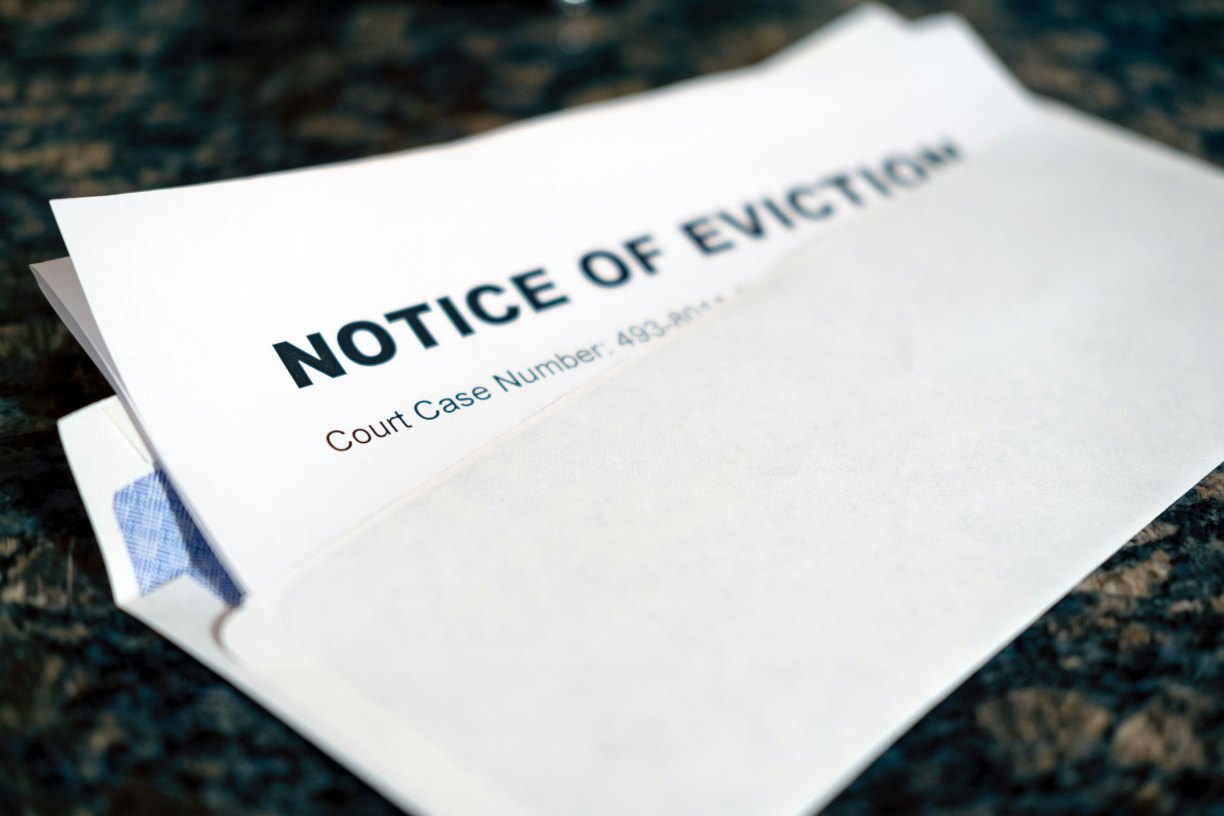Evicting a tenant is one of the toughest parts of being a landlord, and in D.C., it comes with its own set of rules. Eviction involves removing the tenant and their belongings after the court issues a Writ of Restitution. Since evictions can be both costly and time-consuming, it’s always best to try and resolve issues peacefully with the tenant whenever possible.
Step-by-Step Guide to D.C. Evictions
Evicting a tenant in the District of Columbia (D.C.) involves a structured legal process. Below is a detailed guide covering the grounds for eviction:
Step 1: Grounds for Eviction
In D.C., landlords must have a legally valid reason to evict a tenant. Common grounds include:
- Lease Violations: This includes actions like unauthorized occupants, illegal activities, or other breaches of the lease agreement. Landlords must provide a 30-day notice, giving tenants the opportunity to correct the violation.
Nonpayment of Rent: If a tenant owes at least $600 in rent, the landlord can issue a 30-day Notice to Quit.
- End of Tenancy with Proper Notice: In certain situations, such as the landlord's desire to occupy the unit personally or to sell the property, a 90-day notice is required. However, tenants cannot be evicted solely because the lease term has ended, provided they continue to pay rent.
To ensure compliance with proper rent collection and payment procedures, refer to Collecting Rent in D.C. for guidelines on legal practices and obligations.
Step 2: Filing an Eviction Case
To begin the eviction process, landlords must file a case in the Landlord and Tenant Branch of the D.C. Superior Court.
Required Documents:
- Copy of the lease agreement.
- Proof of served notices (e.g., Notice to Quit).
- Documentation of the tenant's violation or nonpayment.
The specific form required for eviction in D.C. depends on the reason for the eviction. Form 1A is used for cases involving nonpayment of rent, while Form 1B applies to violations of tenancy obligations or other legal grounds for eviction. For situations where nonpayment of rent is combined with other grounds, landlords must use Form 1C. Along with the appropriate form, landlords are required to pay a filing fee of $15 to initiate the process.
Step 3: Court Proceedings

During the court hearing, landlords must demonstrate the validity of their case by providing proof of the grounds for eviction. Tenants have the right to defend themselves, with common defenses including claims that rent was paid, that the landlord failed to maintain the property, or that the eviction notice was invalid.
Depending on the evidence and arguments, the court may either issue a Writ of Restitution, granting the landlord the right to proceed with the eviction, or dismiss the case, allowing the tenant to remain in the property.
Step 4: Issuing a Writ of Restitution
The court grants a Writ of Restitution to authorize the eviction process. The writ must be filed with the Landlord and Tenants Court, after which it is forwarded to the U.S. Marshal’s Service for scheduling. The writ expires after 75 days if the eviction is not executed, requiring landlords to re-file for an Alias Writ.
Eviction Scheduling and Timelines in D.C.
Understanding the eviction scheduling and timelines in D.C. is crucial for landlords to manage the process efficiently. Here’s how it works:
Timeframe for Filing and Hearing
The eviction process in D.C. begins with filing the case in the Landlord and Tenant Branch of the D.C. Superior Court. After filing, the court schedules a hearing to review the case. The timeframe for this can vary, but hearings are typically set within a few weeks of filing, depending on the court's schedule and caseload.
The initial hearing will be scheduled for 21 days after the complaint is filed, or 14 days for evictions based on illegal drug activity. Service must be made at least seven days before the initial hearing day for most evictions,and only five days before the trial for drug-related evictions.

Scheduling the Eviction Date
Evictions are scheduled by the U.S. Marshal’s Service based on the date the writs are received and grouped by the same quadrant of the District. Key points include:
- Evictions are not scheduled on weekends, holidays, or judicial training days.
- Evictions are canceled if the 24-hour forecast predicts a 50% or higher chance of precipitation or temperatures below 32°F.
If an eviction is canceled due to weather, it is rescheduled for the next available date. Priority is given to writs nearing expiration or Alias Writs. For purposes of weather forecasts, the National Weather Service Forecast for the Ronald Reagan National Airport is used. Official forecasts are determined at 8:00 am each day.
Landlords are notified of the scheduled eviction date at least one business day in advance. It is critical to be on time, as the U.S. Marshal will wait only 10 minutes for the landlord or their representative to arrive. Landlords are allowed only two rescheduling attempts, so careful planning is essential.
Landlord Responsibilities in the Eviction Process
Landlords play a crucial role, they must adhere to specific responsibilities before, during, and after the eviction to comply with local regulations and avoid potential legal complications.
Legal Obligations
The landlord must comply with D.C. Code § 42-3505.01, which prohibits evictions solely due to lease expiration, No tenant shall be evicted from a rental unit, notwithstanding the expiration of the tenant's lease or rental agreement, so long as the tenant continues to pay the rent to which the housing provider is entitled.
This means that unless the tenant voluntarily moves out or the landlord has legal grounds for eviction ( nonpayment of rent or lease violations ) the tenant cannot be forced to leave. Landlords must understand this regulation to avoid legal disputes and ensure compliance with local laws. For detailed information, visit Retaliatory Actions in D.C. to avoid potential legal complications.
Compliance with Local and Federal Regulations
Landlords are responsible for the following:
- Being present during the eviction or sending a representative.
- Provide accurate contact information and ensure the writ lists the correct property address.
- Hiring the required number of workers for the eviction crew:
- House: 25 people.
- 1-bedroom apartment: 10 people.
- 2-bedroom apartment: 15 people.
- 3-bedroom apartment: 20 people.
- Supplying plastic bags, boxes, or other materials for tenant belongings.
- Arranging for the removal of food, trash, or hazardous items.
- Paying the U.S. Marshal’s Service fee of $165/hour or any fraction thereof.
Landlords are also required to arrange cleanup, including the removal of trash and hazardous items after the eviction is complete.
Alternatives to Eviction in D.C
In D.C., landlords have options to address issues without resorting to eviction, such as negotiating payment plans or utilizing mediation services.
Negotiating Payment Plans
For tenants struggling to pay rent, landlords can offer a payment plan to help them catch up on overdue amounts. This approach not only avoids the expense and time involved in eviction but also provides tenants with an opportunity to stay in their homes.
- Clear Terms: Landlords should draft a formal agreement outlining the payment schedule, including specific amounts and deadlines.
- Flexibility: Consider adjusting terms based on the tenant's financial situation to increase the likelihood of repayment.
- Enforcement: Both parties should sign the agreement to ensure it is legally binding.
Negotiating payment plans demonstrates goodwill and can maintain a positive landlord-tenant relationship while avoiding the need for court intervention.

Mediation Services in D.C.
Mediation offers a structured way for landlords and tenants to resolve disputes with the help of a neutral third party. In D.C., mediation services are available to assist with conflicts over rent, lease terms, or other issues.
- Accessible Resources: Organizations like the D.C. The Office of the Tenant Advocate and community dispute resolution centers provide free or low-cost mediation services.
- Objective Outcomes: A mediator helps both parties communicate effectively and find a solution that works for everyone.
- Legal Documentation: Agreements reached in mediation can be documented and, if necessary, enforced in court.
Choosing one of these alternatives doesn’t just make your life easier—it shows you’re willing to work with your tenant, which can go a long way in resolving issues peacefully. To understand how to manage security deposits legally in D.C., visit D.C. Security Deposits for detailed guidelines.
Bottom Line
Landlords in D.C. must follow a highly regulated D.C. eviction process, with clear scheduling requirements and responsibilities. By understanding the rules, adhering to responsibilities, and exploring alternatives like payment plans or mediation, landlords can protect their interests while fostering a more cooperative relationship with tenants.



